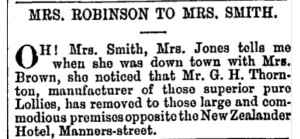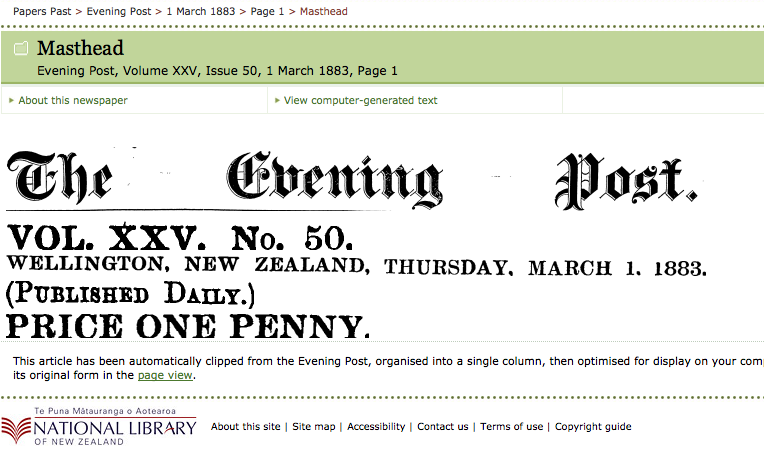What was it like in 1883 according to The Evening Post newspaper? In particular, on 1 March 1883, the day my grandfather was born in Taranaki Street, Wellington in New Zealand. In the births, deaths and marriages section the only death reported was a three month old baby, showing how tenuous life can be 1883.
 On page 2 is the firebell signal warnings for Cook, Te Aro, Lambton and Thorndon wards. One, two, three or four strikes. The fire brigade was probably all volunteers and they needed to know who was being called and what area. Something only smaller country towns need to be concerned about today with our professional brigades in most metro areas.
On page 2 is the firebell signal warnings for Cook, Te Aro, Lambton and Thorndon wards. One, two, three or four strikes. The fire brigade was probably all volunteers and they needed to know who was being called and what area. Something only smaller country towns need to be concerned about today with our professional brigades in most metro areas.
The first page is not covered with the most popular or exciting news stories like today’s newspapers. The Evening Post page one was a page of advertisements. Paying for the papers production probably encouraged the owner to give advertisements such prominence. One of the larger advertisments was placed by Kirkcaldie & Stains, New Zealand’s premier department store since 1863 that still trades today.
Many more of the pages are dominated by advertising for a large range of products from promoting silk fabrics to barbed wire, sheets to shipping freight, breeding rams, Gregg’s coffee from Otago, shoes from Hannah’s, both brands that still trade today. There is property, houses or perhaps you might like a three light chandelier. They range in price from £1 to £15.
 Even in 1883 the writers of the advertisements were trying to catch the readers attention with different headings, styles and copy. Some tried to be funny. Others wrote personal style letters or set the text up in away to try to create patterns to get the readers attention.
Even in 1883 the writers of the advertisements were trying to catch the readers attention with different headings, styles and copy. Some tried to be funny. Others wrote personal style letters or set the text up in away to try to create patterns to get the readers attention.
The Evening Post news was frequently from telegrams from overseas or around the colony. A clerk from the Colonial bank in Dunedin had been committed to trial on three further charges of embezzlement. War like preparations in Turkey are reported. The Nightsoil contract and the Harbour board stopping ships dumping refuse in the harbour was discussed at the City Council. Already by 1883 someone had figured out that polluting the harbour was not a good idea while other could not understand why they could not dump within the harbour.
Then there are the “standard” government controls just like we have our versions today.  There is an advertisement from the Wellington City Council and informing cab, cart and express license holders to renew their licenses so they can keep the same numbers. Even an 1883 the government had a well developed bureaucracy.
There is an advertisement from the Wellington City Council and informing cab, cart and express license holders to renew their licenses so they can keep the same numbers. Even an 1883 the government had a well developed bureaucracy.
The Evening Post documented colonial ship sailings around the country, closing dates for postal services and extremely long winded advertisements over columns of space in the form of letters to the editor. These are different to the 15 second sound bites we are used to in today’s media.

While Wellingtonians read this Evening Post on 1 March 1883 a son was born to be named Charles Adolph Kitto (Dolph), my grandfather. While his parents were probably concerned about his survival at this early stage in his life he lived until 1953. You can read more about him and his life at New Years Honours 1 January 1953 Dolph Kitto.
Source: Papers Past, Evening Post 1 March 1883 for images and content.
This is a further piece in the series about My Family History, about events in my ancestors lives on a particular date. One day I hope to have a blog posting for every day of the year.
Do you wonder what it was like for your ancestors compared to your life style?

Seana, thanks for checking out my post. Kitto is Cornish. A great name for researching as there are not loads like “Jones”. Smith would be heavy work to but exciting every time you discovered a new ancestor. I have difficult names too. The surname Ireland as any googling give you loads of results about the country. Fran
Kitto sounds an unusual name, where does it come from, I wonder? I do like the sound of your having a post for each day of the year, very good idea for readers who can browse around.